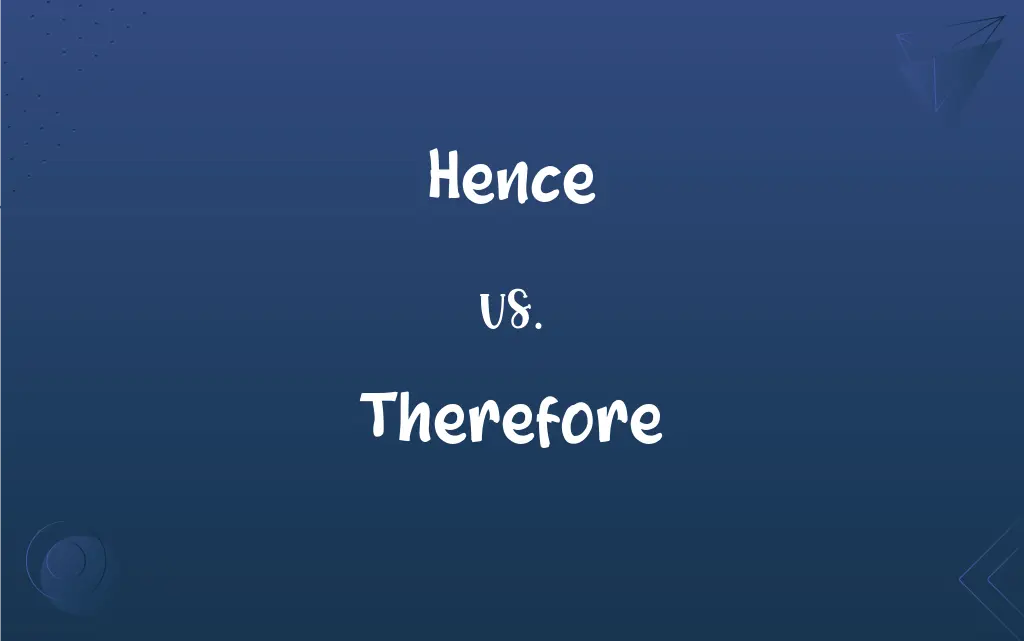Hence vs. Therefore: What's the Difference?
Edited by Aimie Carlson || By Janet White || Updated on September 28, 2023
"Hence" means "from this time" or "for this reason," while "Therefore" strictly means "for that reason."

Key Differences
"Hence" and "Therefore" are both used as transition words to indicate cause and effect in sentences, yet they carry subtle differences.
"Hence" has multiple meanings, including "from this time" or "from this place," but when used synonymously with "Therefore," it means "for this reason." It can suggest both causality and a future point in time. For example, "Spring has started; hence, flowers will bloom soon."
"Therefore," on the other hand, strictly pertains to causality and means "for that reason." It strongly emphasizes the logical consequence of a premise. For instance, "He was late; therefore, he missed the meeting."
The distinction becomes clearer in contexts outside causality. "Hence" can be used temporally or spatially, while "Therefore" is limited to drawing logical conclusions.
When employed in logical arguments or mathematical proofs, both words emphasize the outcome or result of a given premise. Still, "Therefore" is more common and direct in its assertion of causality.
ADVERTISEMENT
Comparison Chart
Definition
"From this time" or "for this reason."
Strictly means "for that reason."
Temporal Usage
Can imply a future point in time.
Not used in this context.
Spatial Usage
Can mean "from this place."
Not used in this context.
Logical Consequence
Used to indicate cause and effect.
Directly and strongly indicates a logical consequence.
Common Usage
Varied but can be synonymous with "Therefore" in some cases.
Mostly confined to indicating causality.
ADVERTISEMENT
Hence and Therefore Definitions
Hence
From this place; away from here.
The bird flew hence.
Therefore
For that reason.
The roads were icy; therefore, school was canceled.
Hence
As a future event or consequence.
It's going to rain; hence, we should stay indoors.
Therefore
As an inference or deduction.
The evidence points to him; therefore, he must be the culprit.
Hence
For this reason; therefore
Handmade and hence expensive.
Therefore
Consequently or as a result.
He missed the train; therefore, he will be late.
Hence
From this source
They grew up in the Sudan.
Hence their interest in Nubian art.
Therefore
In logical terms, because of a premise.
All men are mortal. Socrates is a man; therefore, Socrates is mortal.
Hence
From this time; from now
A year hence it will be forgotten.
Therefore
For that reason or cause; consequently or hence.
Hence
From this place; away from here
Get you hence!.
Therefore
(conjunctive) Consequently, by or in consequence of that or this cause; referring to something previously stated.
Traditional values will always have a place. Therefore, they will never lose relevance.
Hence
From this life.
Therefore
For that; for it (in reference to a previous statement)
Hence
(archaic) from here, from this place, away
I'm going hence, because you have insulted me.
Get thee hence, Satan!
Therefore
For that or this reason, referring to something previously stated; for that.
I have married a wife, and therefore I can not come.
Behold, we have forsaken all, and followed thee; what shall we have therefore?
Hence
From the living or from this world
After a long battle, my poor daughter was taken hence.
Therefore
Consequently; by consequence.
He blushes; therefore he is guilty.
Hence
(of a length of time) in the future from now
A year hence it will be forgotten.
Therefore
(used to introduce a logical conclusion) from that fact or reason or as a result;
Therefore X must be true
The eggs were fresh and hence satisfactory
We were young and thence optimistic
It is late and thus we must go
The witness is biased and so cannot be trusted
Hence
(conjunctive) as a result; therefore, for this reason
I shall go to Japan and hence will not be here in time for the party.
The purse is handmade and hence very expensive.
Therefore
As a consequence;
He had good reason to be grateful for the opportunities which they had made available to him and which consequently led to the good position he now held
Hence
(obsolete) Go away! Begone!
"...Hence! and bestow your dead
Where no wrong against him cries!"
Therefore
To express a conclusion.
She was not feeling well; therefore, she took a day off.
Hence
To utter "hence!" to; to send away.
Hence
To depart; to go away.
Hence
From this place; away.
Arise, let us go hence.
I will send thee far hence unto the Gentiles.
Hence
From this time; in the future; as, a week hence.
Hence
From this reason; therefore; - as an inference or deduction.
Hence, perhaps, it is, that Solomon calls the fear of the Lord the beginning of wisdom.
Hence
From this source or origin.
All other faces borrowed henceTheir light and grace.
Whence come wars and fightings among you? Come they not hence, even of your lusts?
An ancient author prophesied from hence.
Expelled from hence into a worldOf woe and sorrow.
Hence
To send away.
Hence
(used to introduce a logical conclusion) from that fact or reason or as a result;
Therefore X must be true
The eggs were fresh and hence satisfactory
We were young and thence optimistic
It is late and thus we must go
The witness is biased and so cannot be trusted
Hence
From this place;
Get thee hence!
Hence
From this time;
A year hence it will be forgotten
Hence
For this reason.
The evidence was inconclusive; hence, he was acquitted.
Hence
From this time onward.
The store will close in an hour and will not reopen until Monday; hence, make your purchases now.
FAQs
Is "Therefore" used in mathematical proofs?
Yes, it's often used to indicate the logical result of a premise.
Can "Hence" refer to a location?
Yes, as in "moving hence" or "from hence."
Is "Therefore" only about drawing conclusions?
Primarily, yes. It's about drawing a logical consequence or result.
Can "Hence" mean "in the future"?
Yes, as in "Hence, we should see improvements."
Which is more formal: "Hence" or "Therefore"?
Both can be formal, but "Therefore" is more direct in indicating causality.
Do "Henceforth" and "Hence" mean the same?
"Henceforth" specifically means "from this point forward," while "Hence" has varied meanings.
Can "Therefore" start a sentence?
Yes, especially when drawing a conclusion from a prior statement.
Is "Therefore" always about cause and effect?
Largely, yes. It emphasizes the effect based on a cause.
Can "Hence" and "Therefore" be used interchangeably?
In some contexts, yes, especially in indicating causality. But "Hence" has broader meanings.
What's the primary difference between the two?
"Hence" has multiple meanings, including time and place, while "Therefore" is strictly about causality.
Which word is more versatile in meaning?
"Hence" has a broader range of meanings.
Can "Hence" be used in old literature to mean "from here"?
Yes, it's an older usage but valid.
Does "Hence" always look to the future?
Not always, but it can imply a future consequence or result.
Are there any synonyms for "Therefore"?
Yes, words like "thus," "consequently," and "hence" in certain contexts.
Is "Hence" often used in modern English?
It's used, but some of its meanings, like "from this place," are less common in contemporary English.
About Author
Written by
Janet WhiteJanet White has been an esteemed writer and blogger for Difference Wiki. Holding a Master's degree in Science and Medical Journalism from the prestigious Boston University, she has consistently demonstrated her expertise and passion for her field. When she's not immersed in her work, Janet relishes her time exercising, delving into a good book, and cherishing moments with friends and family.
Edited by
Aimie CarlsonAimie Carlson, holding a master's degree in English literature, is a fervent English language enthusiast. She lends her writing talents to Difference Wiki, a prominent website that specializes in comparisons, offering readers insightful analyses that both captivate and inform.































































